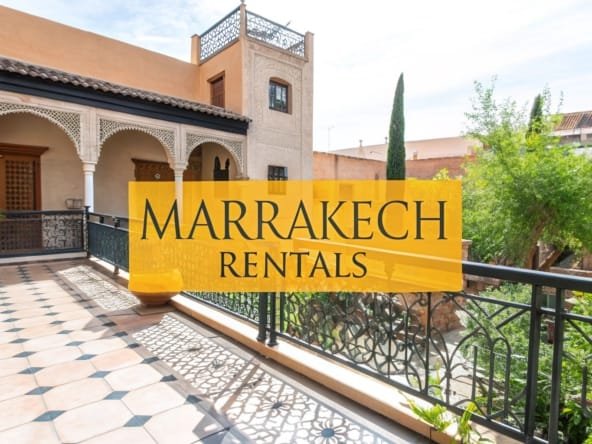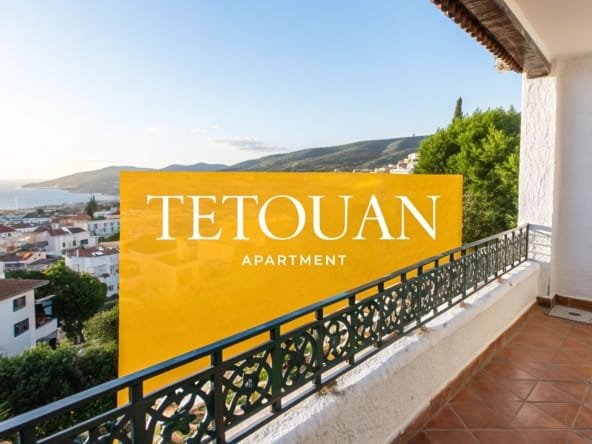Searching for a commercial property for lease in Massachusetts means stepping into a dynamic, multi-faceted market. The best opportunities out there really depend on your specific industry, as the demand for office, retail, and industrial spaces are all following very different paths right now.
Decoding the Massachusetts Commercial Lease Market
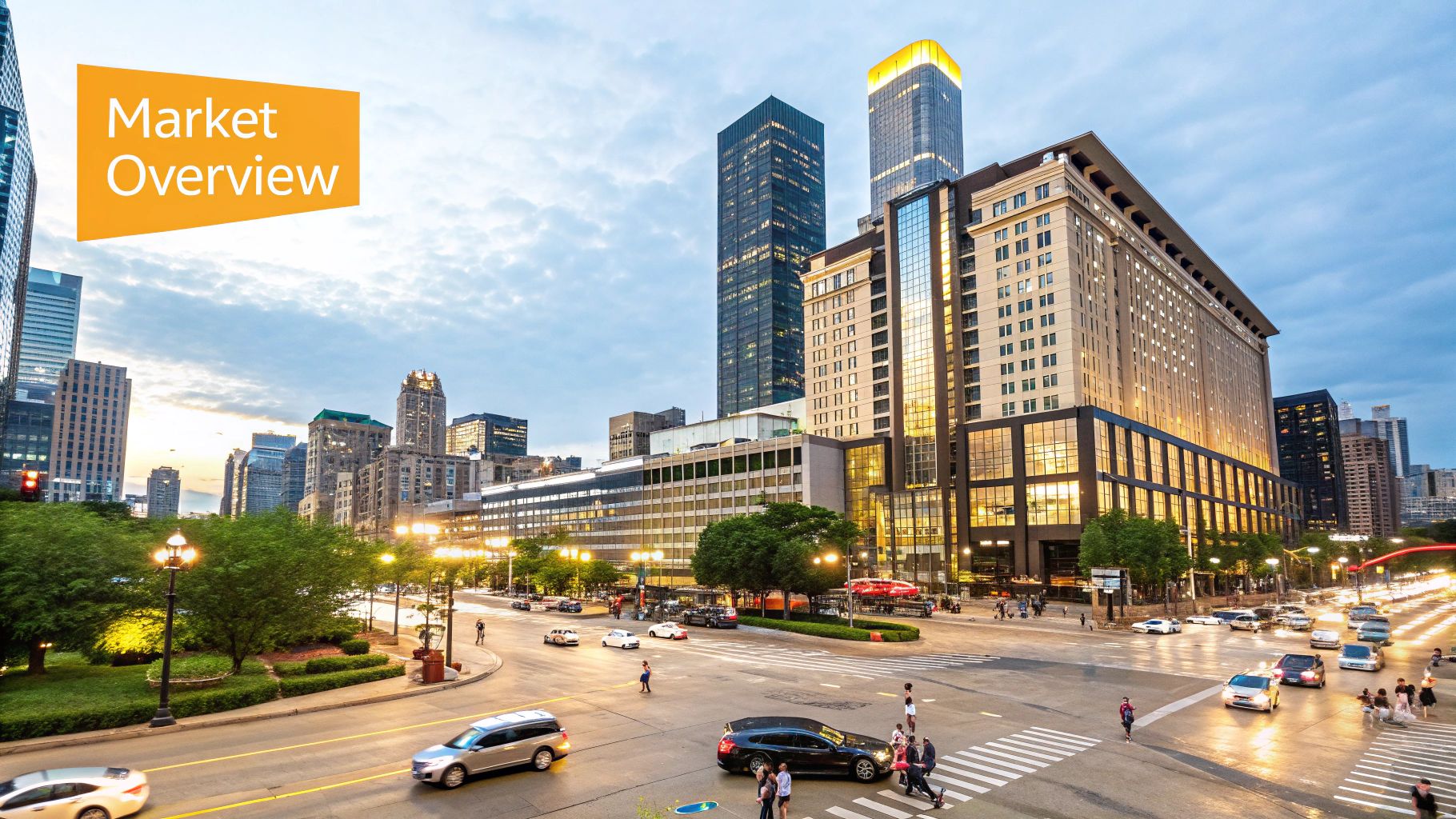
Before you even think about scrolling through listings, it's smart to take a step back and look at the bigger picture. The Massachusetts commercial real estate landscape isn't one-size-fits-all. It's really a mosaic of distinct sub-markets, each with its own set of pressures and opportunities. A move that seems brilliant for one business could be a strategic blunder for another if you ignore the market context.
The biggest story in early 2025 is the stark contrast between the industrial and office sectors. On one hand, the industrial and retail segments are thriving, fueled by the relentless growth of e-commerce and a critical need for warehouses and logistics hubs near major transport routes.
On the other hand, the office sector is navigating a much tougher environment. It's grappling with record-high vacancy rates, a direct result of the seismic shift to remote work. To put it in perspective, the office vacancy rate in Boston climbed to a staggering 13.9% in early 2025—a huge jump from just 6.7% at the end of 2019. You can explore more detailed insights into the Massachusetts commercial real estate market shifts to get a fuller picture.
For anyone looking for space, the key takeaway is this: the current market can give you leverage. While industrial landlords have the upper hand, businesses on the hunt for office space will find they have much more room to negotiate terms, ask for concessions, and secure a really favourable deal.
A Tale of Three Sectors
Understanding the nuances within each property type is absolutely vital. What works for a tech startup in Cambridge simply won’t apply to a distribution centre needing quick access to the Mass Pike.
Here’s a brief look at the state of play for each major property type.
Massachusetts Commercial Property Types at a Glance
| Property Type | Primary Use | Current Market Trend | Key Considerations for Tenants |
|---|---|---|---|
| Industrial | Warehousing, logistics, light manufacturing, distribution | High Demand, Low Vacancy. Driven by e-commerce and supply chain needs. Landlords have a strong negotiating position. | Proximity to major highways (I-90, I-93) is paramount. Expect competitive rents and fewer concessions. Act decisively. |
| Office | Corporate headquarters, professional services, co-working | High Vacancy, Tenant-Friendly. Adapting to hybrid work models. Landlords are motivated to fill space. | This is your chance to negotiate. Look for shorter lease terms, generous tenant improvement (TI) allowances, and amenity-rich buildings. |
| Retail | Shops, restaurants, service-based businesses | Adaptable & Resilient. Strong demand for grocery-anchored centers and locations with drive-thru access. Walkable areas are a plus. | Foot traffic and accessibility are key. The tenant mix in a shopping centre can make or break your business. Focus on locations that match your customer profile. |
This table illustrates just how different the playing field is depending on what you're looking for.
Navigating Rental Costs and Vacancy Rates
Rental costs are a direct reflection of these market trends. In sought-after industrial zones, you should brace yourself for competitive pricing and landlords who aren't offering many freebies.
It's a different story for office space. Average asking rents, particularly for older buildings or in less central locations, have either stayed flat or even dropped. Landlords are far more open to negotiating on the base rent and other financial terms just to get empty floors occupied.
Navigating this market successfully requires a strategic approach. By pinpointing which sector aligns with your business needs and getting a clear sense of the leverage you hold, you can walk into negotiations ready to secure a lease that truly benefits your company's bottom line. For those who do their homework, the current climate presents some significant opportunities.
Finding the Right Commercial Space for Your Business
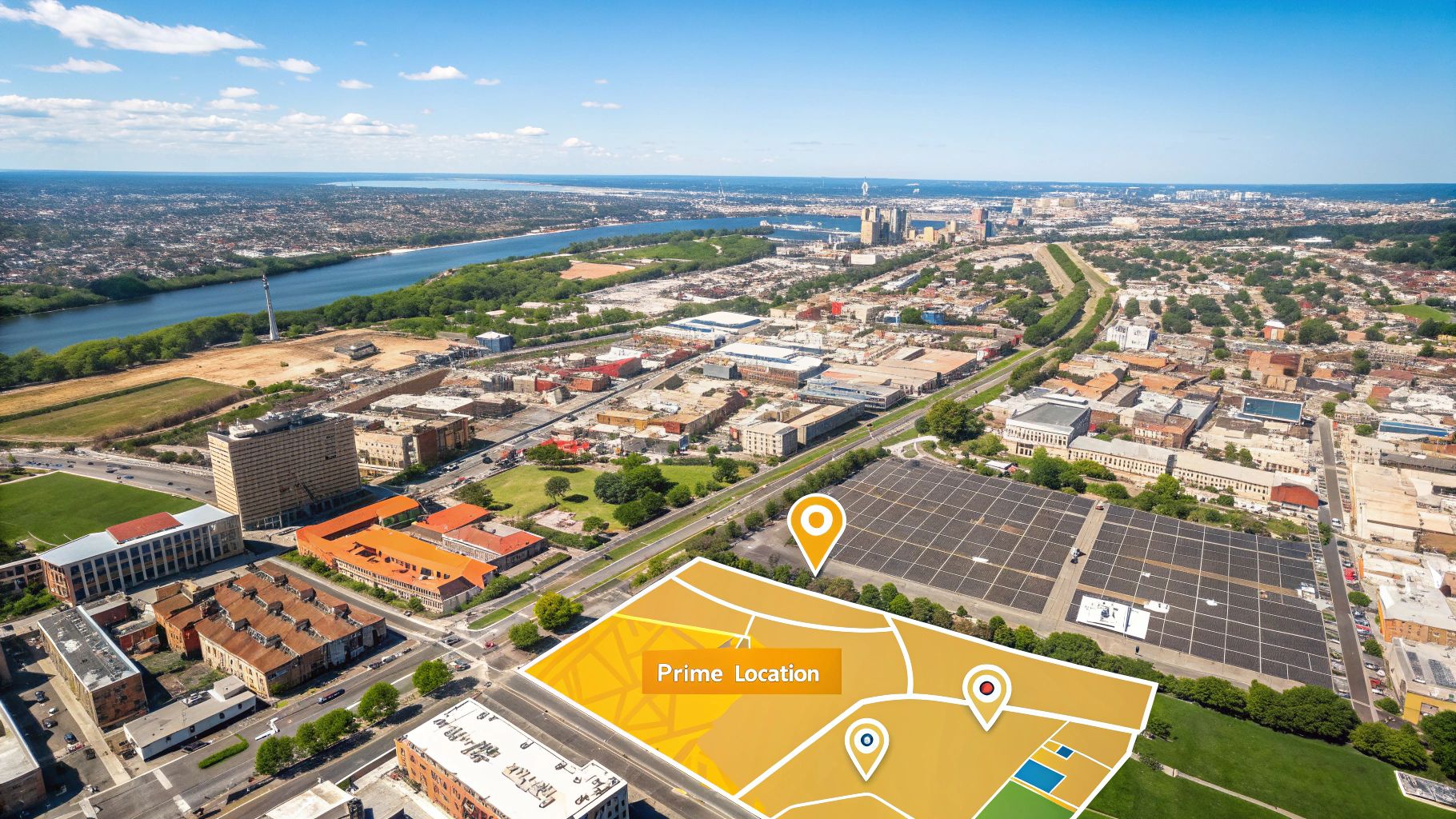
Finding the right commercial property for lease isn't just about finding a place to work; it's about securing a strategic asset. The right space can amplify your efficiency, sharpen your brand image, and pave the way for future growth. To get there, you need to look past simple metrics like square footage and really dig into what your business needs to succeed.
The search should always start with a clear-eyed self-assessment. Before you even glance at a listing, sit down and create a practical list of your absolute must-haves versus your nice-to-haves. This simple exercise is your North Star, keeping you from getting sidetracked by a property that looks impressive but ultimately doesn't serve your operational model.
For instance, a logistics company will likely need multiple loading docks and high ceilings as non-negotiables. For a tech startup, that list might feature redundant fibre-optic internet and a flexible, open-plan layout. Getting this clarity from the outset will save you an incredible amount of time and effort down the line.
Defining Your True Operational Needs
Think about the day-to-day rhythm of your business. How do your employees, clients, and any goods move through your space? Answering this helps you envision a functional layout that’s more than just lines on a floor plan.
It’s crucial to consider the less obvious, yet critical, factors:
- Accessibility: Is there sufficient parking for both staff and customers? How convenient is public transport? These details directly impact your team's commute and your clients' experience.
- Infrastructure: High-speed internet is a given, but what about power capacity? If you run heavy machinery, you'll need to confirm the electrical systems can handle the load. Is the HVAC system modern and reliable?
- Future Growth: Does this space have room for you to grow over the next three to five years? Look for properties with expansion potential or flexible layouts that can be adapted as your team expands.
A common pitfall is focusing too heavily on the monthly rent. A cheaper space that ends up needing a costly electrical upgrade or that hampers your team's efficiency isn't a bargain. The goal is to balance cost with functionality to find the best overall value for your investment.
Uncovering the Best Listings
With your detailed requirements in hand, you’re ready to start the search. The most effective strategy is a multi-pronged one, blending professional guidance with your own research. If you only rely on a single source, you risk missing out on the perfect spot.
A qualified commercial real estate agent (or agent immobilier) is an invaluable partner in Morocco. They have access to listings and market intelligence that you won't find publicly, including off-market opportunities. Their local market experience is a massive advantage, especially when it comes to negotiation.
That said, don't leave it all to your agent. Proactively browse Moroccan property portals. Sites like Mubawab and Sarouty.ma are excellent for getting a feel for the available inventory and comparing prices across different neighbourhoods.
Mastering Your Property Search Strategy
A systematic approach will always yield better results. Here's a practical way to organise your hunt for a commercial property for lease:
First, find an agent who specialises in your specific sector—be it retail, industrial, or office space—and knows your target city inside and out. Their focused expertise is far more valuable than a generalist's.
Next, make a habit of checking the major online property platforms. Set up alerts for your specific criteria so you're notified the moment a new, suitable property hits the market.
Finally, don't underestimate the power of old-fashioned legwork. Talk to other business owners in your target areas and simply drive around looking for "À Louer" (For Lease) signs. This grassroots approach can often uncover hidden gems that haven't been widely advertised.
The Importance of Zoning and Permits
Before you get too attached to a property, you absolutely must verify its zoning classification (plan d'urbanisme). Municipal zoning laws in Morocco dictate precisely how a property can be used. That space might look perfect for your new café, but if it's not zoned for commercial food service, it's a non-starter.
You can usually find this zoning information by visiting the local agence urbaine or the municipal planning department. This is a critical due diligence step that cannot be skipped.
Along the same lines, think about the permits your specific business will need. Will you require a certain business licence (patente), a health department permit, or specific authorisations for signage? Investigating these requirements upfront ensures you only pursue properties where you can operate legally and without facing frustrating and costly delays. This proactive check is one of the most important steps in securing a viable commercial property for lease in Morocco.
Getting to Grips with the Commercial Lease Agreement
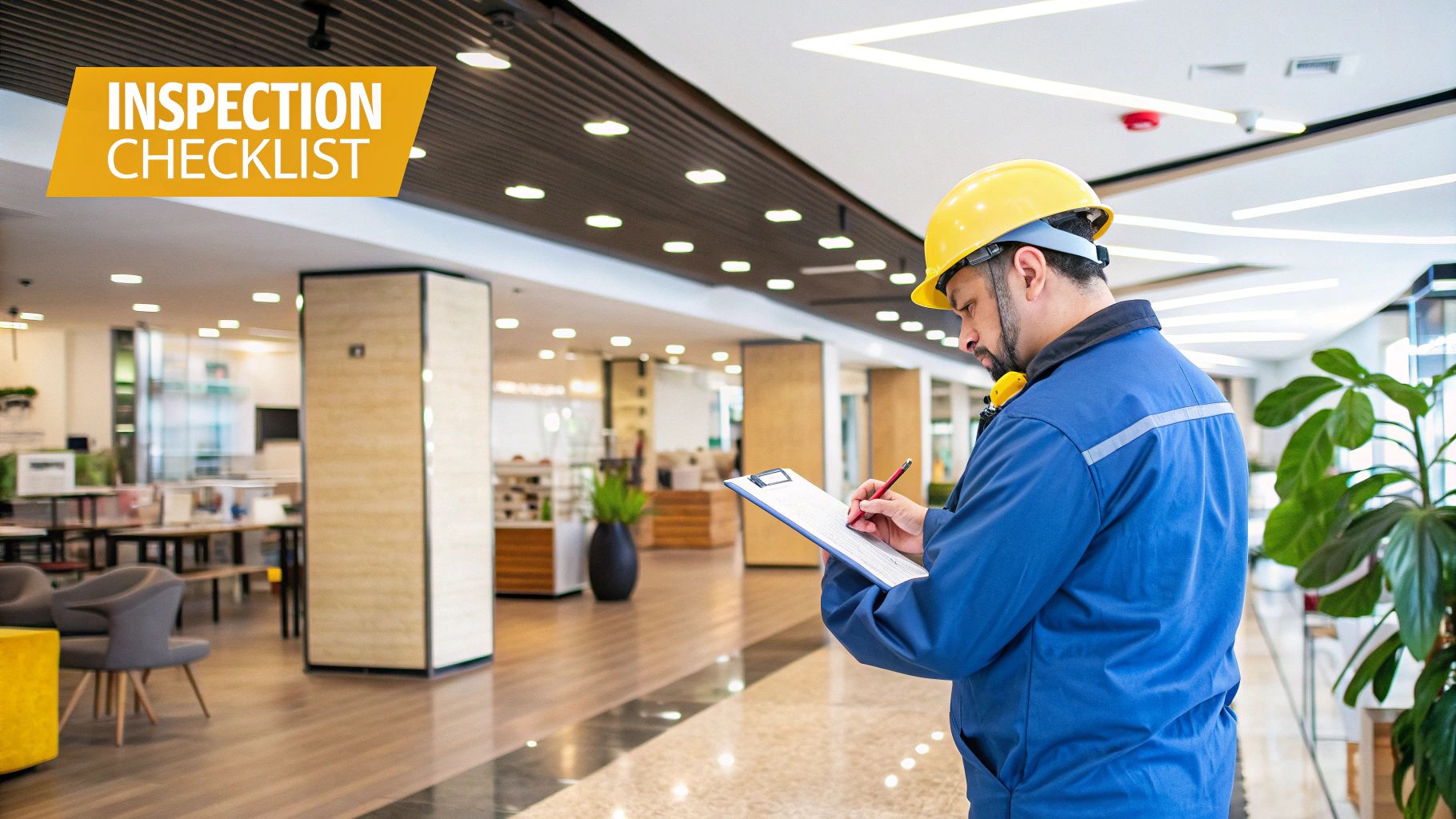
The commercial lease agreement, or bail commercial in Morocco, is the absolute bedrock of your tenancy. It’s so much more than a simple rental form; it’s a legally binding contract that spells out every single right and responsibility for both you and the landlord. Getting comfortable with its dense legal language isn't just a good idea—it's essential for protecting your business.
I’ve seen too many business owners make the critical mistake of just scanning for the rent figure and the lease duration. That's a shortcut to expensive problems. The real meat is in the fine print, dictating everything from how you can operate to your financial obligations and your ability to adapt down the line. A single poorly worded clause can easily spark disputes and operational nightmares.
So, before you even think about signing, you need to dissect this document. Treat it like the architectural blueprint for your business's new location. Each clause is a structural support, and if one is weak, the whole arrangement can become unstable. Investing the time now to truly understand and negotiate these terms will build a solid foundation for your future success.
Key Clauses You Can't Afford to Skim
While every lease has its own quirks, some clauses are universal and carry immense weight. I always advise my clients to zoom in on these specific sections, as they are often the most fertile ground for both negotiation and potential conflict. A sharp eye here is your best defense.
The lease term (durée du bail) is your commitment period. In Morocco, longer terms—often nine years—are quite common for commercial leases, and they grant tenants significant rights. But for a newer or fast-growing business, a shorter term might offer the flexibility you desperately need. You have to weigh your long-term business strategy against the stability a longer lease provides.
Next, you need to understand exactly how your rent is calculated. It’s rarely just a flat monthly fee. You’ll typically run into two main structures:
- Gross Lease: Think of this as an all-inclusive price. The landlord covers property taxes, insurance, and maintenance costs. It makes budgeting predictable, but the headline rent will naturally be higher.
- Net Lease: Here, you pay a lower base rent but also cover a share (or all) of the building's operating expenses. The Triple Net (NNN) lease—where you pay for taxes, insurance, and maintenance—is extremely common, especially for retail and industrial spaces.
A piece of hard-won advice: If you’re looking at a Net lease, always demand a detailed estimate of all operating expenses. Without it, you're flying blind and could be hit with skyrocketing costs that cripple your budget. Insist on absolute clarity before you sign anything.
Negotiating for Allowances and Future Flexibility
One of the most powerful negotiating tools you have is the Tenant Improvement (TI) allowance. This is a specific amount of money the landlord contributes to help you build out the space to fit your business. This can cover anything from putting up walls and installing specialty lighting to upgrading the floors.
The generosity of TI allowances often moves with the market. For instance, the Massachusetts commercial leasing market is forecast to reach $11.2 billion by 2025. With higher vacancy in its office sector, landlords there have become more willing to offer big TI packages to secure good tenants. You can find more on how market dynamics influence these concessions to get a sense of these trends.
Finally, always protect your future. Pay close attention to clauses covering renewal and subletting. An option to renew gives you the right to stay in a location where your business is flourishing—a priceless advantage. A subletting clause is your financial safety net, allowing you to lease out part of your space if your needs shrink or change. Landlords will almost always want the right to approve a subtenant, so negotiate for reasonable and fair terms from day one.
As you begin your search, looking at different spaces will give you a much better feel for what landlords are offering. You can start by browsing a diverse selection of listings for commercial property for rent on our site.
Mastering Your Lease Negotiation Strategy
This is where the real money is saved. Skillful negotiation isn't about being aggressive or trying to win every point; it's about building a solid, data-driven case to secure terms that will support your business for years to come. A smart approach here can genuinely slash your overheads and give you a powerful head start.
Your best asset in any negotiation is solid market intelligence. Before you even think about making an offer, you need to be armed with the facts. What are the current vacancy rates for the type of property you’re after? A high vacancy rate almost always puts you in the driver's seat. Landlords don’t make money on empty buildings, so they're far more motivated to strike a deal.
You'll also need to get your hands on comparable leases, or "comps." These are just recent deals for similar properties in the immediate area. This data is your benchmark for what's fair, ensuring you don't end up overpaying. A good commercial property agent will be your best friend here, as they live and breathe this information.
Identifying Negotiable Lease Terms
Everyone focuses on the base rent, but that’s only one piece of the puzzle. I’ve seen tenants secure incredible value by looking beyond the monthly payment and focusing on other clauses in the agreement. The biggest wins often come from negotiating terms that give you more financial breathing room and flexibility.
Think about targeting these key areas:
- Rent Escalation Clauses: Most long-term leases will have a clause for annual rent increases. You can, and should, negotiate for a lower percentage increase or, even better, a fixed cap. This gives you predictable costs down the line.
- Security Deposit: It’s standard for landlords to ask for a few months' rent as a security deposit. If your business has a strong financial track record, you have a good case for negotiating this amount down. That’s working capital freed up for your business, not theirs.
- Rent-Free Period: This is a fantastic and common concession. A rent abatement period, usually for the first few months, lets you fit out your new space without the financial pressure of paying rent. It’s a massive boost to your initial cash flow.
This breakdown shows the essential costs you'll need to factor into your budget before you even start talking numbers.
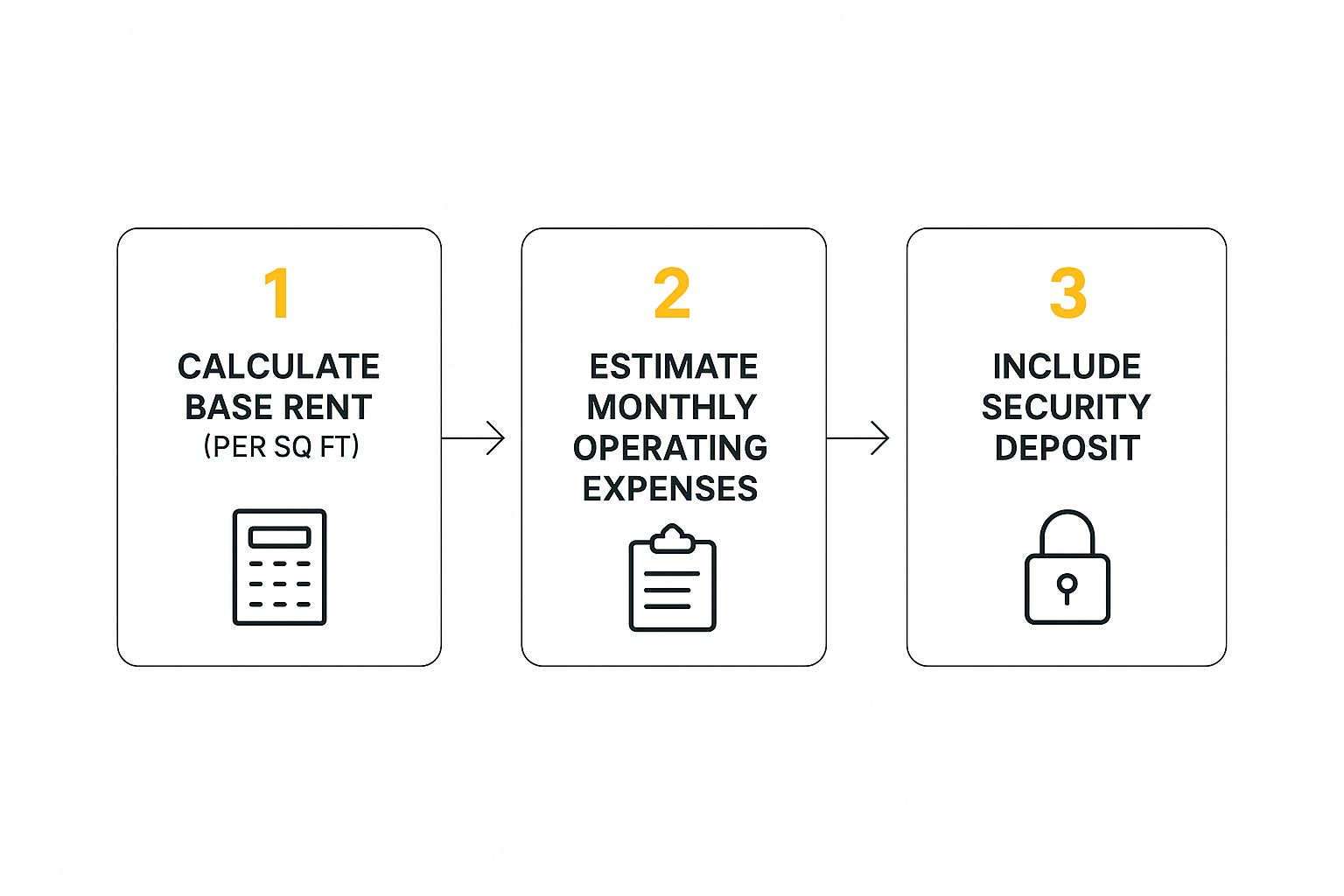
Getting a firm grip on these financial components is the first step toward crafting a realistic offer and building a strong negotiating position.
Arguing for Valuable Concessions
Your power to win concessions comes down to two things: the landlord's motivation and your strength as a potential tenant. In a market where supply outstrips demand (a tenant's market), landlords are far more inclined to offer incentives to get their spaces filled.
Just look at what happened in Massachusetts. By 2022, tenant concessions for office space had climbed to an average of over $15 per square foot, accounting for almost a quarter of the total rent value. While the market has shifted since then, it’s a perfect illustration of how landlords use tools like rent reductions and improvement allowances to attract tenants when vacancy rates are high. You can see more data on how market conditions shape landlord concessions and use that as a playbook for your own strategy.
Your goal should be to frame the lease as a partnership, not just a transaction. A landlord with a reliable, long-term tenant has a secure income stream. When you ask for concessions, present them as what's needed for your business to succeed—which, in turn, guarantees their rent.
One of the most significant points to negotiate is the Tenant Improvement (TI) allowance. This is the money the landlord gives you to customise the space for your needs. Don't be timid here. If the property needs a lot of work to be functional for your business, ask for a bigger allowance. Back it up with a clear, professional build-out plan to show you’re serious and have done your homework. A higher TI allowance directly cuts your upfront costs and can be one of the most impactful terms you negotiate. Your success here really sets the financial stage for your new location.
The Final Check: Your Legal and Financial Due Diligence
Before you even think about signing on the dotted line, it's time for the most critical phase: due diligence. Think of this as your last line of defence. It’s your chance to uncover any hidden problems that could cripple your business later on. Skipping this step is like buying a used car without popping the bonnet—you’re just asking for trouble.
This isn't a quick once-over. It's a deep dive, involving both a professional physical inspection and a thorough legal check of the property. You've probably walked through the space a few times, but that's not enough. You need an expert eye.
Getting a Professional Property Inspection
You absolutely need to hire a qualified inspector, specifically one who knows commercial buildings inside and out. Their job is to go beyond the surface and check the very bones of the property. This isn't about noting a scuff on the wall; it's about identifying major structural issues, the real condition of the roof, and the state of the plumbing.
The big-ticket items are the HVAC (heating, ventilation, and air conditioning) and electrical systems. A failing HVAC unit or an outdated electrical panel that can't support your equipment can mean thousands in unexpected costs. Depending on your lease, those costs could fall directly on you.
Don't Skip the Zoning and Permit Checks
At the same time, you need to dig into the legal side. Just because a space looks like the perfect spot for your new café doesn't mean the local authorities agree. You have to head to the municipal planning department and verify its zoning.
Make sure the property is zoned correctly for your specific type of business. If it isn't, you might have to apply for a variance—a process that is often long, costly, and has no guarantee of success. It's far smarter to know this from the start.
You also need to find out exactly what permits your business will need. This could include:
- A Certificate of Occupancy to prove the building is safe.
- Specific business licences required by the local municipality.
- Special permits for things like an outdoor terrace, signage, or handling specific materials.
Getting a handle on these requirements early will save you from major headaches and delays when you’re trying to open.
An experienced business owner once told me, "The money you spend on inspectors and legal advice before signing is the cheapest insurance you'll ever buy." This advice is gold. A few hundred dirhams now can save you from a six-figure mistake.
Building Your Real-World Financial Forecast
Finally, it’s time to get brutally honest with your budget. The biggest mistake I see new tenants make is underestimating their total monthly costs. The number on the lease agreement is just the starting point.
Grab a spreadsheet and list every single potential expense. Be meticulous. Your list should include:
- Utilities: Water, electricity, and internet. Don't be shy about asking the landlord for previous utility bills to get a realistic baseline.
- Common Area Maintenance (CAM) Fees: For Triple Net (NNN) leases, this covers your share of maintaining car parks, lobbies, and landscaping.
- Property Taxes and Insurance: Also part of a Net lease, these are your portion of the building’s total tax and insurance costs.
- Fit-Out Costs: Any renovation expenses that go beyond the landlord’s Tenant Improvement (TI) allowance.
- Moving and Setup Costs: The price of the move itself, plus getting your phone lines and IT network up and running.
Moroccan law also has specific tax implications for leasing that need to be considered. Having a crystal-clear financial plan prevents nasty surprises that can drain your cash flow right after you move in.
For those considering acquisition over leasing, our guide on how to invest in Morocco real estate provides a broader look at the diligence required for purchasing property. By carefully scrutinising every legal and financial detail, you can be confident that your chosen commercial property for lease will be a launchpad for success, not a financial trap.
Common Questions About Leasing Commercial Property
Diving into the world of commercial real estate can feel overwhelming. It’s a field filled with its own language and nuances, and it’s perfectly normal to have questions. In fact, even seasoned business owners run into unique situations that need a second look.
Getting straight answers is key to making a smart decision when you’re looking for a commercial property for lease. This section breaks down some of the most frequent questions we hear from clients in Morocco, offering practical insights to help you navigate the process with confidence and sidestep common pitfalls.
What Is a Typical Lease Term Length in Morocco?
You’ll find that most commercial lease terms in Morocco land somewhere between three and ten years. There’s no one-size-fits-all answer; the right length really comes down to your business and the specific property.
For startups or businesses in rapidly changing sectors, a shorter term of three to five years is often the sweet spot. It provides crucial flexibility, letting you adapt or move without being tied down by a long, rigid contract.
On the other hand, larger, more established companies often prefer longer terms, typically in the seven to ten-year range. Landlords love the security of a long-term tenant and are usually more open to negotiating favourable rent and offering significant fit-out contributions in exchange for that commitment.
How Is Rent Calculated in a Commercial Lease?
Commercial rent is almost always quoted as an annual price per square metre. To get your monthly payment, you simply multiply that rate by your total area and divide by twelve. But what’s included in that rent can differ dramatically.
You'll generally come across two main structures:
- Gross Lease: This is the simplest model. You pay one flat rental fee, and the landlord handles all the property’s operating costs, like taxes, insurance, and common area maintenance. It makes for very predictable budgeting.
- Net Lease: With a net lease, you pay a lower base rent plus a share of the operating expenses. These are often called Single (N), Double (NN), or Triple Net (NNN) leases. A Triple Net (NNN) lease—where the tenant covers taxes, insurance, and all maintenance—is incredibly common, especially for standalone retail and industrial buildings.
It's vital to get a clear breakdown of estimated operating expenses for any Net lease you consider. These "pass-through" costs can fluctuate, and you need a realistic picture of your total monthly financial obligation before signing.
Can I Sublet My Commercial Space?
The ability to sublet isn't a given—it all hinges on the sublease clause in your agreement. Most landlords will insist on having the right to approve any potential subtenant in writing before you can proceed.
This is a clause you absolutely want to negotiate from the outset. Business needs can change in a heartbeat. Maybe you outgrow the space faster than expected, or a market shift means you need to downsize. A well-negotiated sublease clause acts as a critical safety net, giving you an exit strategy to offset the cost of a space you no longer need.
Without it, you could be stuck paying the full rent on an empty or underused property, a financial burden that can seriously impact your bottom line.
Who Is Responsible for Repairs and Maintenance?
Defining who pays for repairs is one of the most important aspects of any lease and a frequent source of disputes. It’s essential that these responsibilities are spelled out with no room for interpretation.
Here’s the typical breakdown:
- In a Gross lease, the landlord is generally on the hook for most repairs, particularly major structural elements and systems like the roof, foundation, and HVAC. That’s what your higher base rent is covering.
- In a Triple Net (NNN) lease, the responsibility shifts almost entirely to you, the tenant. You’ll typically cover all maintenance and repairs for your unit, which can include pricey items like the air conditioning.
Always get these duties clarified in black and white. You don’t want to be surprised by a five-figure repair bill you never saw coming. Understanding these obligations is fundamental when choosing the right commercial property for lease for your budget.
Are you ready to find the perfect commercial space for your business in Morocco? The expert team at Rich Lion Properties has deep market knowledge and a commitment to client success. We guide you through every step, from identifying the right property to negotiating the best possible lease terms. Contact us today to get started.

